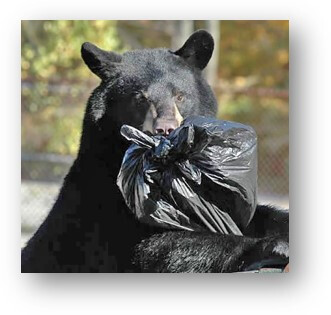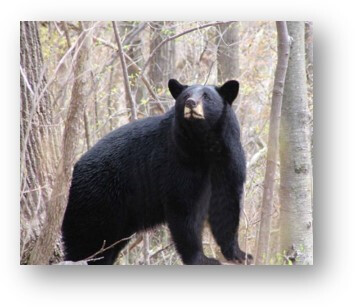Active Fall Period for Black Bears Begins, Secure Trash
Residents and outdoor enthusiasts throughout New Jersey are encouraged to strictly adhere to guidelines for eliminating or securing potential food sources for black bears as they actively forage for food in preparation for the winter denning season.
People who live in or visit areas of New Jersey where bears are active should be alert to the presence of bears and take steps to avoid interactions with them.
Property owners, hikers, and campers can reduce the likelihood of attracting bears if they diligently bear-proof residences and camps by removing or properly securing any potential food sources.
“Black bears are preparing to den up for the winter season and need to consume substantial amounts of food in the fall,” DEP Fish and Wildlife Assistant Commissioner David Golden said. “If you live in or visit areas frequented by bears, it is important to ensure they will not find food near your homes, as bears will naturally take advantage of easy meals by searching through unsecured garbage cans and commercial trash bins or raiding bird feeders.”
Most of New Jersey's black bears live in the northwest portion of the state, particularly Morris, Sussex, Warren,
and northern Passaic counties, and portions of Hunterdon, Somerset,
and Bergen counties. However, black bears have been sighted in all of New Jersey’s 21 counties.
In FY22, the Murphy Administration earmarked $1.5 million for the DEP to expand non-lethal management methods for black bears, which has enabled the DEP to significantly increase public education and outreach efforts, including the development and implementation of a statewide multimedia outreach campaign. That funding level has also been maintained for FY23.
The campaign included bilingual advertisements using social media, search, digital, video, streaming radio, public service announcements, and email blasts on multiple platforms and devices.
It also included a redesign of the black bear web pages on the DEP Fish and Wildlife website, making it easier for people to find important information about bears. DEP Fish and Wildlife plan to continue the successful digital campaign.
In addition, DEP Fish and Wildlife is finalizing the hiring of a program specialist to further educate the public about black bears in New Jersey and how to avoid conflicts with them.
The specialist will work directly with municipalities to provide guidance for reducing human-bear interactions and assist with developing a comprehensive program addressing how to manage garbage and reduce its attraction to bears as a potential food source.
It is critically important for people to never feed black bears. Bears attracted to neighborhoods may learn to associate people with food.
These animals may then become nuisance bears that cause property damage, seek handouts from people or become dangerous.
Intentionally feeding bears is illegal in New Jersey and carries a fine of up to $1,000.

The DEP offers the following tips for property owners to minimize conflicts with bears:
- Secure trash and eliminate obvious sources of food such as pet food bowls, easy-to-reach bird feeders, or food residue left on barbecue grills.
- Use certified bear-resistant garbage containers if possible. Otherwise, store all garbage in containers with tight-fitting lids and place them along the inside walls of your garage, or in the basement, a sturdy shed, or another secure area.
- Wash garbage containers frequently with a disinfectant solution to remove odors. Put out garbage on collection day, not the night before.
- Avoid feeding birds when bears are active. If you choose to feed birds, do so during daylight hours only and bring feeders indoors at night. Suspend birdfeeders from a free-hanging wire, making sure they are at least 10 feet off the ground. Clean up spilled seeds and shells daily.
- Immediately remove all uneaten food and food bowls used by pets fed outdoors.
- Clean outdoor grills and utensils to remove food and grease residue. Store grills securely.
- Do not place meat or any sweet foods in compost piles.
- Remove fruit or nuts that fall from trees in your yard.
- Properly install electric fencing as an effective way to protect crops, beehives, and livestock.

If you encounter a black bear in your neighborhood or outdoors while hiking or camping, follow these safety tips:
- Remain calm. Never run from a bear, as this may trigger its predatory instinct. Instead, slowly back away. Avoid direct eye contact, which may be perceived by a bear as a challenge. Make sure the bear has an escape route.
- To scare the bear away, make loud noises by yelling, using a whistle, banging pots and pans, or blowing an air horn. Make yourself look as big as possible by waving your arms. If you are with someone else, stand close together with your arms raised above your head.
- Make bears aware of your presence by speaking in an assertive voice, singing, clapping your hands, or making other noises. If hiking through bear country, always make your presence known through loud talking or clapping of hands.
- If a bear utters a series of huffs, makes popping jaw sounds by snapping its jaws or swats the ground, these are warning signs that you are too close. Slowly back away and avoid direct eye contact. Do not run.
- If a bear stands on its hind legs or moves closer, it may be trying to get a better view or detect scents in the air. This is usually a non-threatening behavior.
- Black bears will sometimes "bluff charge" when cornered, threatened, or attempting to steal food. Stand your ground, avoid direct eye contact, slowly back away, and do not run.
- If the bear does not leave, move to a secure area, such as a vehicle or a building.
- Families who live in areas frequented by black bears should have a “Bear Plan” in place for children, with an escape route and planned use of whistles and air horns.
- Black bear attacks are extremely rare. If a black bear does attack, fight back.
Report black bear damage or aggressive bears to your local police department or to Fish & Wildlife by calling 1-(877) WARN DEP (1-877-927-6337).
For more information about black bears in New Jersey, visit www.dep.nj.gov/njfw/bears/














